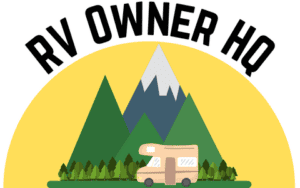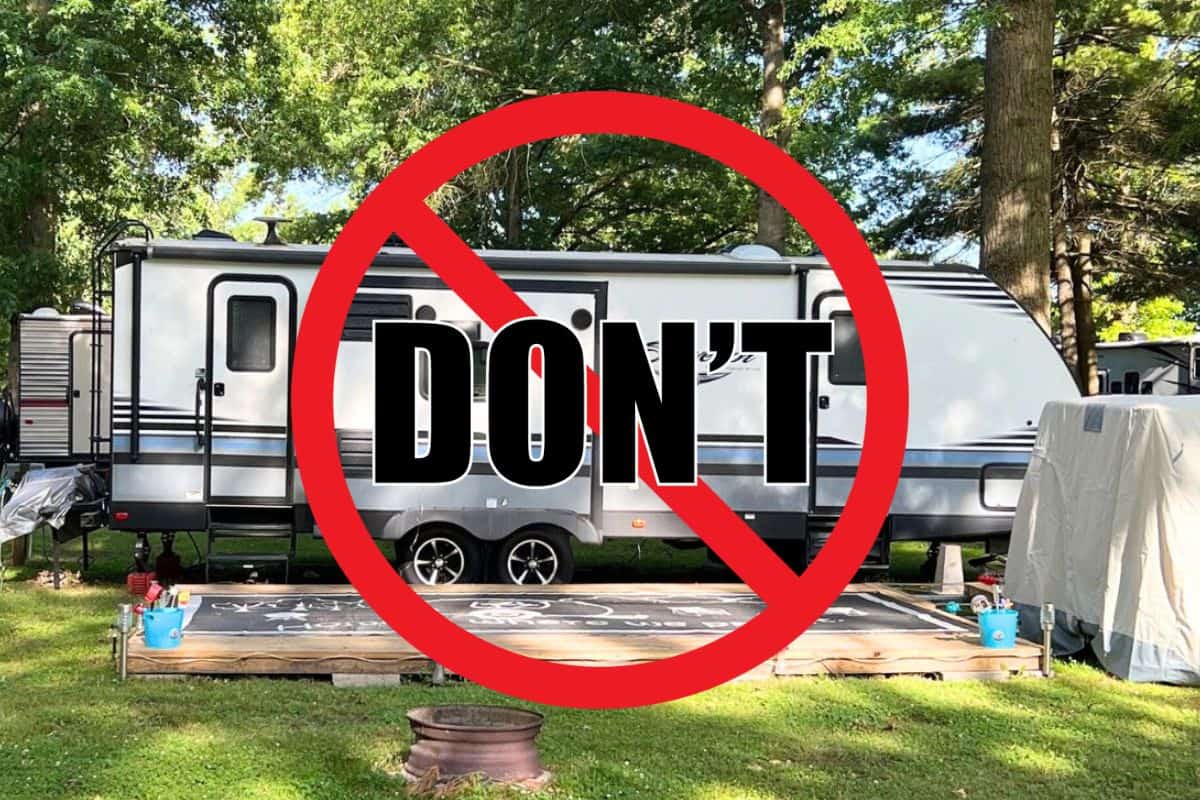Full-time RV living is an exciting adventure, however, it’s also full of pitfalls. Avoiding common mistakes can often make the difference between loving or leaving RV life.
Because of this, I’ve put together 24 “don’ts” that every full-time RVer should know.
These aren’t just theories either, they’re hard-learned lessons from thousands of miles on the road, countless campground conversations, and real experiences from the RV community.
Think of this guide as your roadmap to avoiding the potholes on your journey to successful Full-Time RV living.
What Not to Do While Full-Time RV Living:
1. Don’t Bring too Many Clothes or Duplicate Items
Living in an RV means embracing a minimalist mindset, and nothing clutters precious storage space faster than an oversized wardrobe or redundant items. Focus on versatile clothing pieces that can be layered and mixed, and remember the 90/90 Rule, if you haven’t worn it in three months and don’t plan to in the next 3 months, it’s probably taking up valuable space that could be better used for other items.
2. Don’t Buy Bulk Items
While those warehouse club memberships might seem like money-savers, bulk shopping is the nemesis of efficient RV living. Not only do large packages eat up limited storage space, but they can also add unnecessary weight to your rig and often lead to waste since many items can expire before you use them. Stick to buying what you need for 2 to 3 weeks at a time.
3. Avoid Traveling During Bad Weather
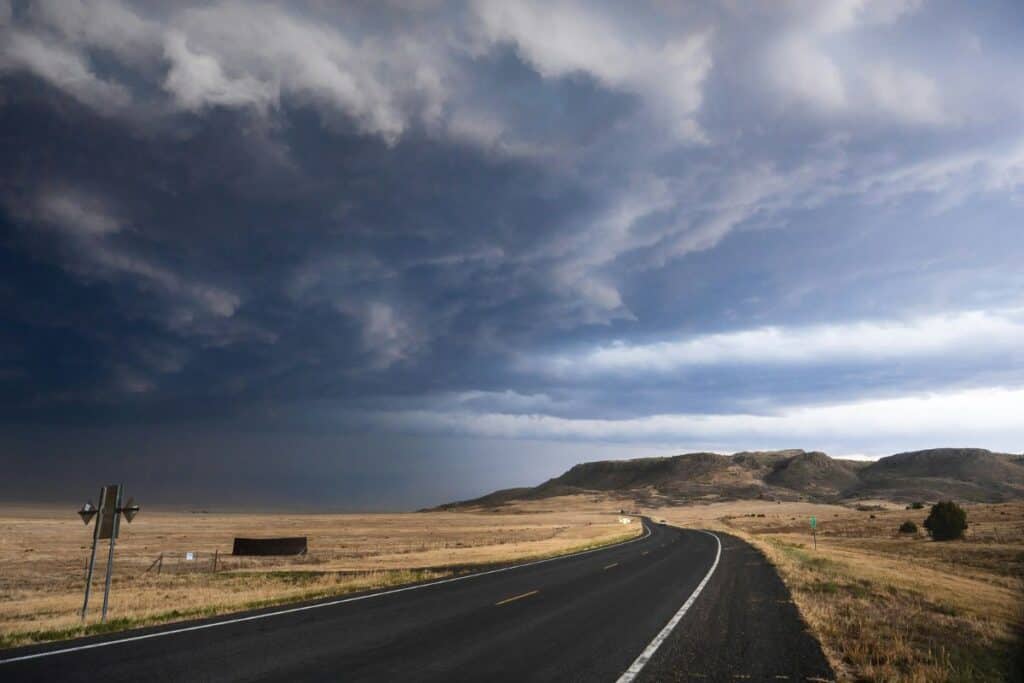
Mother Nature demands respect when you’re driving a home on wheels. Attempting to travel during adverse weather conditions isn’t just unpleasant, it’s downright dangerous. High winds can turn your RV into a sail, while rain and snow can create treacherous driving conditions that put you and your home at risk, so always check weather forecasts and be willing to wait out storms.
4. Don’t Collect Large Souvenirs
The desire to collect mementos from your travels can be strong, but large souvenirs quickly become space-hogging burdens in an RV. Instead of physical keepsakes, capture your memories through photos, small local crafts, or digital collections, your limited storage space will thank you, and you won’t have to part with cherished items later due to space constraints.
5. Don’t Travel Without an Emergency Fund
The road can throw unexpected curveballs your way, from mechanical issues to emergency repairs, which is why traveling without a robust emergency fund is like driving an RV without a spare tire. Aim to keep at least $3,000-$5,000 set aside specifically for unexpected repairs and emergencies. Remember, when your RV is your vehicle and home, you can’t afford to be stranded without financial backup.
6. Don’t Assume Every Place Accepts Credit Cards
While most urban areas readily accept plastic, RV life often takes you through rural areas and remote locations where cash is still king. From small-town repair shops to local campgrounds and farmers’ markets, carrying a reasonable amount of cash can save you from awkward situations and ensure you’re never stuck without a way to pay for necessities.
7. Don’t Drive After Dark if Possible

Navigating an RV after sunset introduces a whole new set of challenges, including reduced visibility, harder-to-spot low branches or obstacles, and increased difficulty in finding your campsite or reading site markers. Plan your travel days to arrive at your destination while the sun is still high enough to give you ample time for setup, and if you must drive at night, reduce your speed and stay extra vigilant.
8. Don’t Plan too Many Miles Per Day
The biggest mistake new full-time RVers make is treating their rig like a car and planning marathon driving days. Pushing beyond 300-400 miles per day not only leads to exhaustion but also robs you of the joy of discovering unexpected places along your route. Remember, RV life is about the journey, not just the destination. Plan shorter travel days with plenty of buffer time for breaks and spontaneous explorations.
9. Don’t Let Your Fuel Level Drop Below a 1/4 Tank
Letting your fuel gauge dip too low in an RV isn’t just risky, it’s potentially stranding. Not all gas stations can accommodate large rigs, and in remote areas, stations can be surprisingly far apart. Keep your tank above quarter-full, use apps like GasBuddy to locate RV-friendly stations, and always fuel up before heading into unfamiliar or remote areas.
10. Don’t Ignore Weather Forecasts & Seasonal Patterns
Weather patterns can make or break your RV experience, and ignoring them is like playing RV Russian roulette. From avoiding hurricane zones during storm season to understanding when mountain passes typically close for winter, successful full-time RVing requires you to plan your routes around seasonal weather patterns and stay vigilant about incoming weather systems that could impact your travel plans.
11. Don’t Skip Regular Maintenance Checks
Your RV is both your home and vehicle, making regular maintenance doubly important for safety and comfort. From checking seals and inspecting the roof for leaks to maintaining your generator and testing safety equipment. Create and follow a comprehensive maintenance schedule to prevent costly repairs and extend your RV’s lifespan. Remember, an ounce of prevention is worth a pound of cure, especially when you’re miles from the nearest RV repair shop.
12. Don’t Ignore Unusual Sounds or Problems
That strange noise or small issue you’ve been putting off could be the warning sign of a much bigger problem brewing. Whether it’s a new squeak, an unusual smell, or a slight change in how your RV handles, addressing small problems immediately can prevent them from becoming major mechanical failures that could leave you stranded or facing expensive repairs.
13. Don’t Forget to Check Tire Pressure & Condition
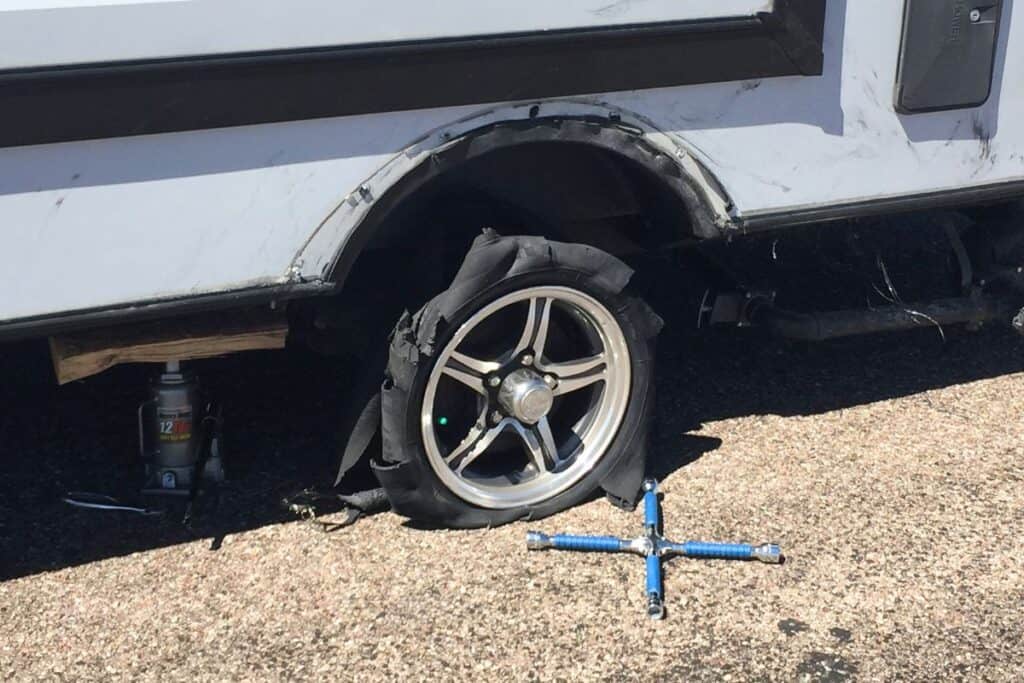
Your RV tires are literally where the rubber meets the road, and they’re carrying your entire home’s weight. Checking tire pressure regularly, including before every travel day, and inspecting for wear, damage, or aging isn’t just about preventing flats; it’s about ensuring your safety on the road. Remember that RV tires often age out before they wear out, so check those manufacturing dates regularly.
14. Don’t Rely on a Single Source of Internet Connectivity
In today’s connected world, especially for digital nomads and remote workers, having reliable internet is crucial. Depending solely on one provider or method can leave you struggling to stay connected. Maintain multiple options like cellular data plans from different carriers and perhaps even a satellite internet solution like Starlink for those off-grid adventures.
15. Don’t Let Pets Roam Unleashed

While the freedom of RV life is amazing, letting your pets roam freely at campgrounds or in unfamiliar areas puts them at risk. From wildlife encounters to getting lost in new surroundings, keeping your pets leashed isn’t just about following campground rules, it’s about protecting your furry family members in environments that aren’t as safe or familiar as your old backyard.
To see more pet tips, check out our blog post “29 Genius RV Hacks for Dogs Every Pet Owner Needs to Know“.
16. Don’t Use Regular Toilet Paper
Your RV’s black tank system is far more sensitive than regular home plumbing, and standard toilet paper can quickly lead to clogs and expensive repairs. RV-specific toilet paper is designed to break down quickly in your tank, preventing those dreaded clogs. While it might cost a bit more, it’s far cheaper than dealing with a backed-up black tank system in the middle of nowhere.
17. Don’t Leave Awnings Out in Strong Winds
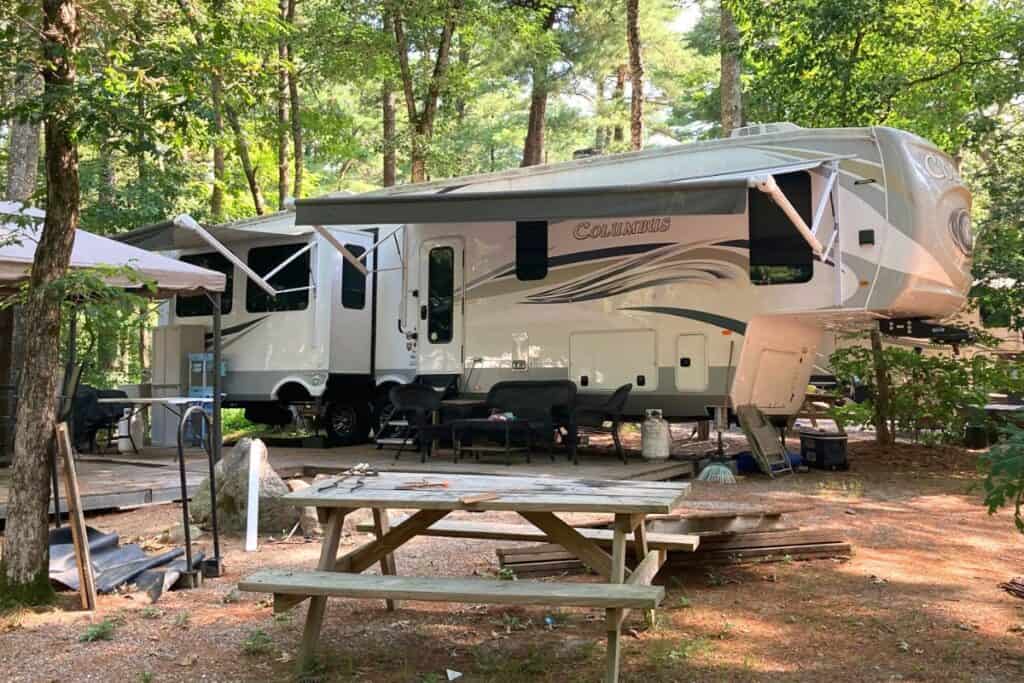
An RV awning can go from being a lovely shade provider to an expensive repair bill in mere seconds when strong winds hit. Even a moderate breeze can catch your awning like a sail, potentially causing severe damage to both the awning and your RV’s exterior. Always retract your awning when leaving your rig unattended, and don’t wait until the wind picks up. If there’s any doubt, roll it up.
18. Don’t Forget to Winterize in Cold Weather
Failing to properly winterize your RV in freezing temperatures can result in catastrophic damage to your water system, with burst pipes and damaged tanks being just the beginning. Even if you’re planning to camp in cold weather, ensuring your RV is properly winterized or equipped with the right cold-weather protection isn’t optional, it’s essential for protecting your investment and maintaining functionality.
19. Don’t Isolate Yourself
One of the biggest challenges of full-time RV living isn’t mechanical or practical, it’s maintaining social connections. While the freedom of the open road is incredible, humans need community. Join RV groups, attend rallies, participate in campground activities, and make an effort to maintain connections with both fellow travelers and friends back home. The RV community is wonderfully welcoming, but you have to make an effort to engage.
20. Don’t Rush From Place to Place
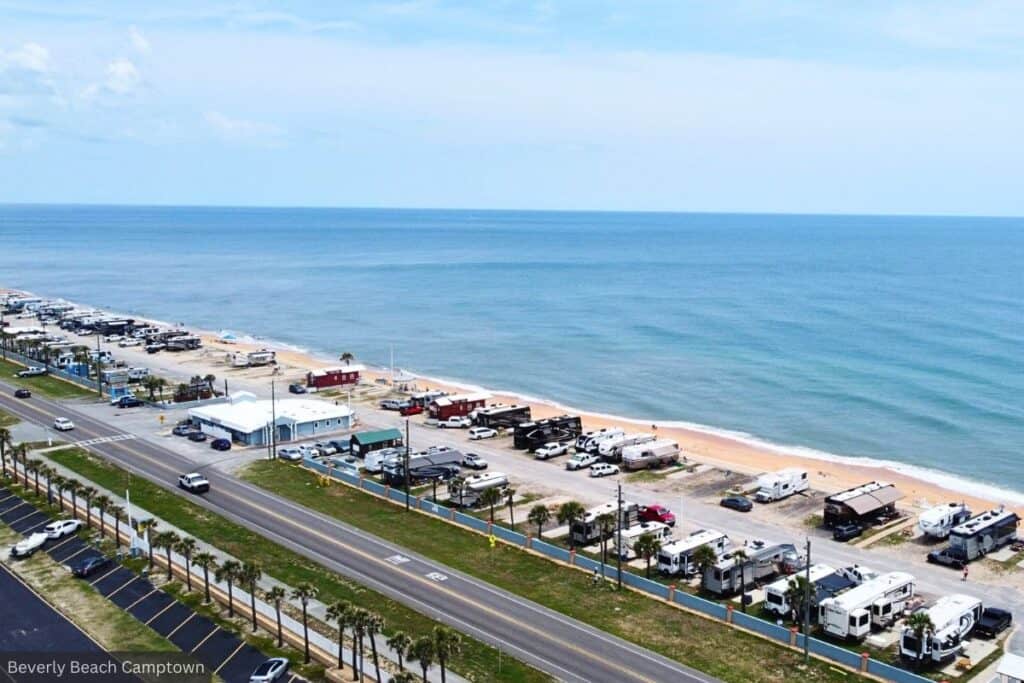
The beauty of full-time RV living lies in the freedom to truly experience each destination, not just check it off a list. Racing from place to place not only increases stress and fuel costs but also robs you of the chance to immerse yourself in local culture and discover hidden gems. Slow down and stay longer in places that speak to you, like Florida RV parks on the beach. Remember that quality of experience trumps quantity of destinations every time.
21. Don’t Forget to Exercise Regularly
Living in an RV doesn’t mean your fitness routine should hit the road. While you might not have access to a traditional home gym, the great outdoors becomes your fitness center. Whether it’s hiking trails, swimming in lakes, or using portable exercise equipment, maintaining regular physical activity is crucial for your health and your ability to handle the physical demands of RV life.
22. Don’t Neglect Regular Medical Check-ups
Being on the road shouldn’t mean putting your health on hold. Establishing a system for maintaining regular medical care is essential for full-time RVers. Whether it’s finding a national healthcare provider, utilizing telemedicine, or planning your travels around annual check-ups, staying on top of your health ensures you can continue enjoying the RV lifestyle for years to come.
23. Don’t Forget to Stock Basic Medications
When you’re miles from the nearest pharmacy, having a well-stocked medical kit isn’t just convenient, it’s crucial. Keep a supply of your prescription medications, plus common over-the-counter remedies for everything from allergies to upset stomachs. Remember that familiar brands may not be available in every location, and some remote areas might have limited pharmacy access.
24. Don’t Wait to the Last Minute to Book Campgrounds
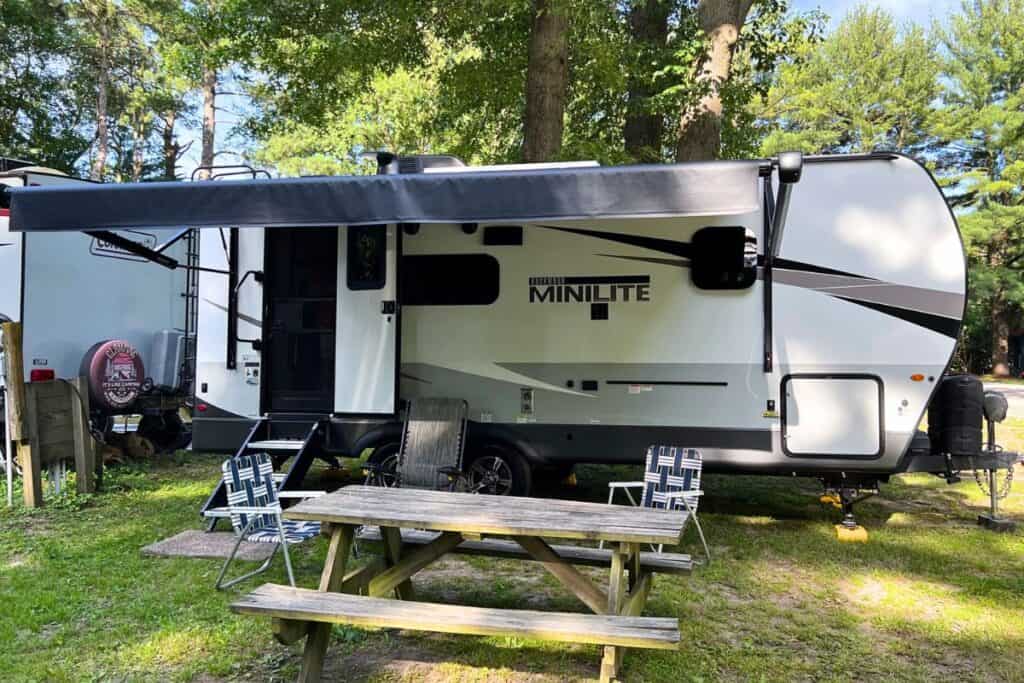
The days of easily finding last-minute campground spots are largely behind us, especially in popular destinations during peak seasons. Many sought-after campgrounds fill up months in advance, and showing up without a reservation can lead to stress, extra expenses, or even having to completely alter your travel plans. Develop a booking strategy that balances planning with flexibility. Many experienced RVers recommend booking must-visit destinations well ahead while keeping some time open for spontaneous adventures.
Additional Full-Time RV Living Resources:
- Can You Live Full Time in a Class B RV? (Unpacking the Truth)
- Best RV Parks for Full-Time Living: By State
- 8 Best Class B+ RVs for Full-Time Living: Rolling Homes
Recent Posts
When cruising down the highway in your RV, the last thing you want is a tire blowout! Not only is it dangerous, but RV tire replacement isn't cheap, costing $200 to $300 per tire. The good news,...
Nothing ruins an RV adventure faster than a breakdown with no way to fix it. Because of this, every RVer should have a well-stocked RV tool kit for those unexpected roadside emergencies and campsite...
